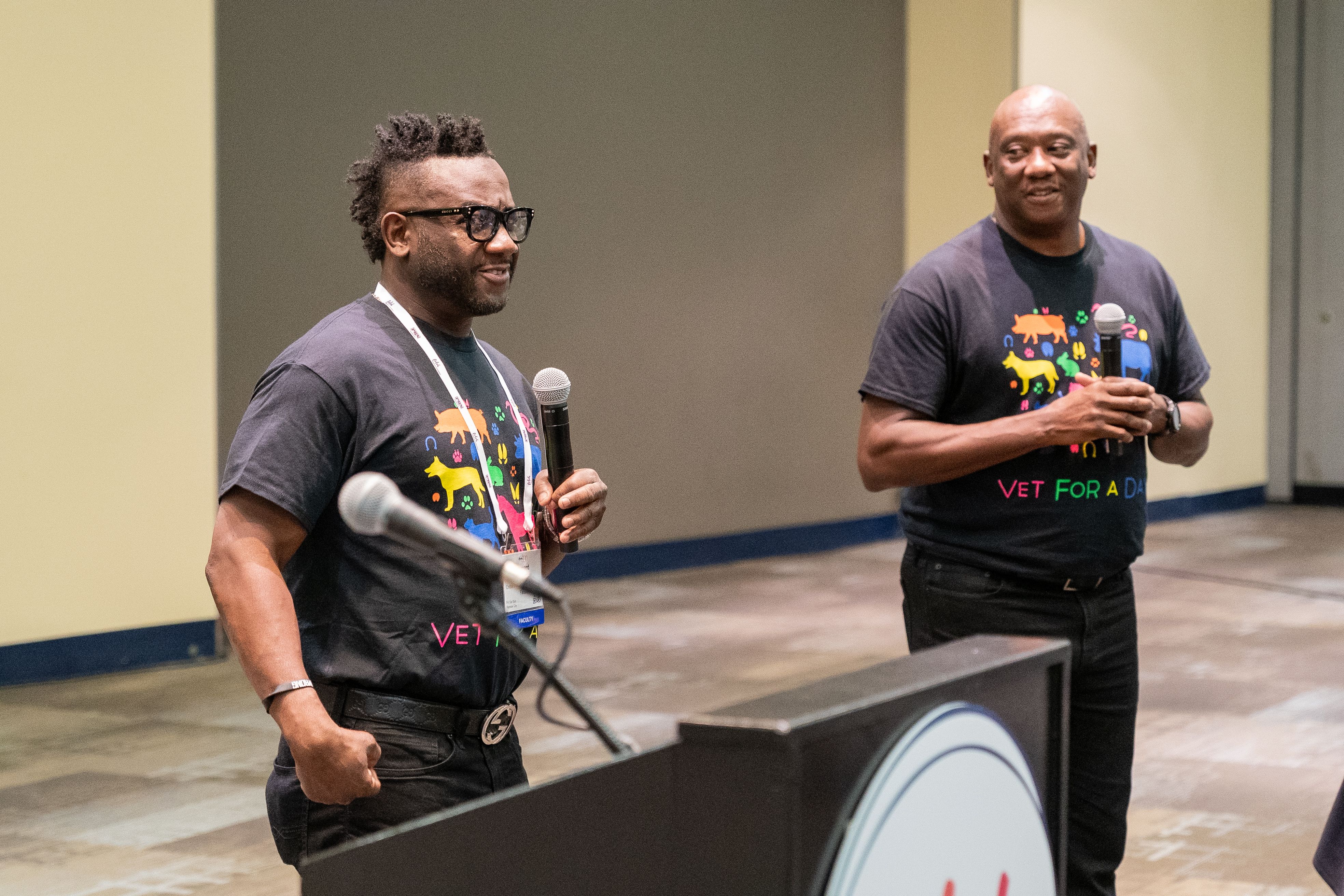Critter Fixers stars: Representation matters in veterinary medicine
Georgia doctors explain how their TV show not only sheds light on the reality of veterinary medicine, but also shows individuals from all backgrounds that a career in veterinary medicine is possible
Drs Hodges and Ferguson at the Vet for a Day program.

Years ago in college, a young Vernard Hodges met a young Terrence Ferguson in a class they shared. After going from classmates to close friends, the pair pursued careers in veterinary medicine together. From there, they had no idea the path, both in veterinary medicine and the media, that was on the horizon.
“A lot of people ask, ‘What is the key to your relationship?’ I think, of course, there’s trust, but I think the main thing is that we were friends before we ever even thought about being business partners. We had no idea 30 years ago that we would both be veterinarians and we’d be working together, but [we] just [have] that friendship and respect for each other and trust. This is why we’re still partners some years later,” Ferguson explained.
Hodges said he believes if you are good at what you do and passionate about it, people will notice and find you. On March 6, 2018, Hodges received an instant message asking if he and Ferguson were interested in being on a TV show where they would be followed around by a camera crew at their clinic. Hodges originally ignored it, thinking it was spam, but when the man reached out again, he knew it was a serious offer.
Today, the veterinarians own and work at Critter Fixers Veterinary Hospital in South Byron, Georgia; star in the National Geographic Wild show Critter Fixers: Country Vets; and attend events across the United States educating children and their parents about veterinary medicine and how they can become the next Critter Fixer.
Their impact
Their TV show gives viewers a closer look into the world of veterinary medicine, and it has a real impact on individuals of all ages and backgrounds. The pair encourages everyone in the community, regardless of whether they have a pet, to come see their clinic and learn more about what they do behind the exam room doors.
“When they asked us about doing the show, one of the things we were adamant about was we wanted to represent the veterinary medical profession in the most professional way. That was first: We wanted to make sure that it was represented well. And the second thing was, we wanted it to show who we were, that we are people who care about the next generation of veterinarians. We both have foundations, we both do different things for kids, and [we enjoy] kind of showing kids the way,” Hodges said.
Ferguson and Hodges visit schools with their Vet for a Day program to teach students about veterinary medicine and all that it has to offer for them. Since Vet for a Day was created, they have taught children in cities all over the US with the hopes of continuing to show children the special career that is being a veterinary professional.
Besides providing resources for the community to learn, Hodges and Ferguson said they love that their show gives them a platform to inspire younger Black individuals to come up in a field that is not well-diversified, to help make it more diverse for them and their future. As they continue to educate and entertain families across the country, Ferguson hopes their show will have this impact on those watching.
“Representation matters, because just seeing us allows them to know that there’s something that they can do. I was that 9-year-old, 10-year-old, 15-year-old kid who wanted to be a veterinarian, and I never had that example. I didn’t have it until I was in undergrad and there was a time when I became discouraged. I never saw it so innately; I didn’t know if I could do it because I had never seen a Black veterinarian before,” Ferguson said.
He added, “It wasn’t until I met the first [Black] veterinarian, I talked to him, and I got reinvigorated to want to pursue veterinary medicine. I felt like I could do it. So that’s what we are doing. When they see us on television, we’re real. This is something that you can do, and we want to give the kids who love animals [the knowledge that they can] become a veterinarian.”
